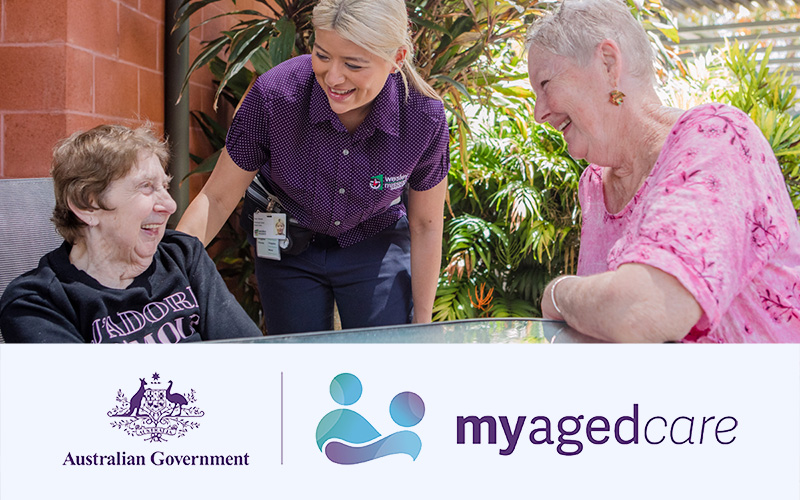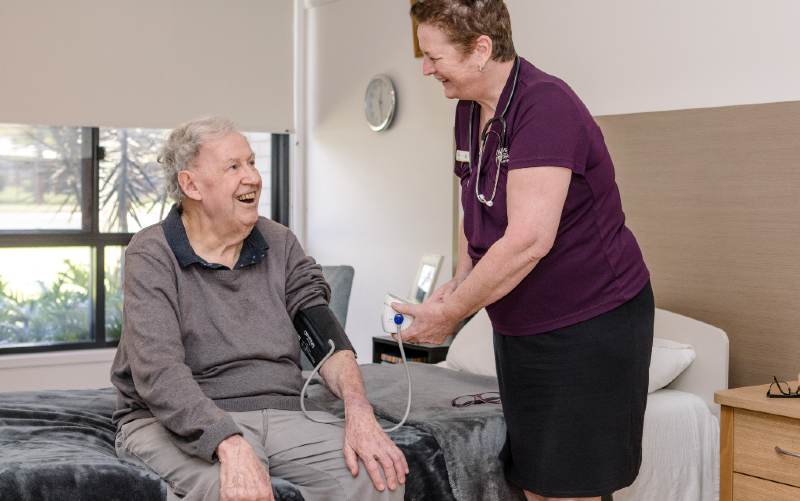We answer some of the most commonly asked questions about the ACAT assessment to help you prepare for this crucial step in accessing aged care services that best suit your specific circumstances.
Call now 1800 448 448. Our warm and friendly Aged Care Specialists are waiting to chat with you. Don't wait, connect today!
ACAT stands for Aged Care Assessment Team. It is a team that assesses individuals' care needs to determine eligibility for aged care services.
My Aged Care is a government agency designed to assist individuals and their families in navigating the aged care system in Australia. The ACAT (Aged Care Assessment Team) are specialised teams of healthcare professionals that conduct assessments as part of the My Aged Care process. These assessments determine an individual's eligibility and care needs for government-funded aged care services provided through My Aged Care.
The role of the Aged Care Assessment Team (ACAT) is to assess individuals' care needs and determine their eligibility for government-funded aged care services. ACAT plays a crucial role in ensuring individuals receive appropriate care and support based on their assessed requirements.
To request an ACAT assessment, contact My Aged Care on 1800 200 422. They will guide you through the process and, if eligible, they will refer your request to the Aged Care Assessment Team (ACAT) in your area. If you prefer to request it online, visit My Aged Care’s Assessment Application tool. It takes approximately 15–20 minutes to complete. Alternatively, your social worker, doctor, or other health professionals can organise this for you on your behalf.
Yes, an ACAT assessment is mandatory to access government-funded aged care services in Australia, such as such as residential aged care, home care packages, respite care, or transition care. The assessment determines your care needs and eligibility. For privately funded arrangements, the need for an ACAT assessment may not be mandatory. For CHSP funding, an ACAT assessment is not required to access support. It is advisable to consult with aged care providers or relevant professionals to understand the specific requirements and recommendations based on your specific needs and goals.
ACAT can assess for various types of aged care services, including but not limited to Home Care Packages (HCP), residential aged care (nursing homes), respite care, transition care, and other government-funded aged care programs. The assessment helps determine the most suitable services based on individual care needs.
Yes, ACAT can assess for residential aged care placement. The assessment helps determine if an individual requires residential care and assesses their care needs to recommend the appropriate level of support. This enables access to government-funded residential aged care services in suitable facilities.
If your care needs change after the ACAT assessment, you have the option to request a review of your current plan. Contact My Aged Care or your local ACAT team to inform them of the changes in your circumstances. They will review your updated care needs and, if required, conduct a new assessment to determine if you require a different level of care or additional support services. A review ensures that your care plan remains aligned with your current requirements, enabling you to access the appropriate level of care and support as your needs evolve over time.
No, the ACAT assessment process is free of charge. It is a government-funded service designed to assess your care needs and determine your eligibility for aged care services without any cost to you.
Yes, ACAT assessments are available for individuals living in rural or remote areas. The Aged Care Assessment Teams (ACAT) are present throughout Australia, including rural and remote regions. These teams are committed to providing equitable access to aged care services, ensuring that people in all areas can receive a comprehensive assessment of their care needs. Whether you reside in a city, regional town, or a remote community, you can reach out to My Aged Care or your local ACAT team to request an assessment and access aged care services.
A RAS assessment is the Regional Assessment Service that determines eligibility for the Commonwealth Home Support Program (CHSP). It's for lower-level care needs entry-level support services, such as help with household tasks or personal care. ACAT assessment evaluates higher-level care needs for Home Care Packages (HCP) and residential aged care. To determine whether you need a RAS or ACAT assessment, and to initiate the assessment process, contact My Aged Care on 1800 200 422. They will guide you through the appropriate assessment based on your care requirements.
Yes, after the assessment the Aged Care Assessment Team (ACAT) will discuss possible accommodation options that are suitable for the person with dementia. Depending on your circumstances, they may suggest facilities that would be appropriate for providing dementia care.
An ACAT assessment typically takes place in the following locations:
The assessment location is often chosen based on your preferences, convenience, and individual circumstances. It aims to ensure a comfortable and accessible environment for the assessment process.
To prepare for an ACAT assessment, follow these steps:
By preparing for the ACAT assessment, you can contribute to a comprehensive evaluation of your care needs, making it easier for the assessors to recommend the most suitable aged care services for you.
An ACAT assessment typically takes around 45min to 2 hours. The duration may vary based on individual circumstances and the complexity of care needs. The assessors ensure a thorough evaluation to determine the appropriate level of care and support for the individual.
The ACAT assessment is conducted by a team of qualified health professionals. The team may include nurses, social workers, occupational therapists, physiotherapists, or other relevant specialists. They possess the expertise and training to assess aged care needs and determine eligibility for aged care services.
During the ACAT assessment, a team of qualified health professionals will review your health conditions, daily living activities, and support requirements. The assessors may ask questions, conduct interviews, and observe your functional abilities. It is essential to be honest and open during the assessment to ensure accurate evaluation. The outcome will determine the level of care you are eligible for, such as Home Care Packages (HCP) or residential aged care, based on your assessed needs.
During the ACAT assessment, the following steps typically occur:
An ACAT assessor might ask you about:
Yes, you can have a family member, friend, or carer present during the ACAT assessment if you wish. Having a supportive companion with you can provide comfort and help share valuable insights about your care needs. The assessors welcome the presence of a trusted individual during the assessment process.
No. During the ACAT assessment, the focus is on evaluating your care needs to determine your eligibility for aged care services. The income and assets assessment will be conducted at a later stage to determine the level of government subsidy you may be eligible for and the fees you may need to pay for the aged care services you receive.
While you may discuss your financial circumstances with the ACAT assessors during the assessment, you do not need to present a detailed income and assets list on the day of the assessment.
Yes, you will receive a copy of the ACAT assessment outcome and recommendations. The assessors provide a written report that outlines the assessment findings, your eligibility for aged care services and the level of care recommended. This report helps you understand the outcome of the assessment and guides your access to appropriate aged care services.
The timing of receiving your ACAT assessment report can vary based on several factors, including the complexity of your assessment and the workload of the ACAT team. In general, you can expect to receive your ACAT assessment report within a few weeks after the assessment takes place. The report will be sent to you by mail or email, depending on your preferences and the practices of the ACAT team in your area. If there are any delays or if you have not received the report within a reasonable timeframe, you can contact the ACAT team or My Aged Care for an update on the status of your assessment report.
Once deemed eligible through an ACAT assessment, you will be placed on the government’s national waiting list until you are assigned a package. To find information on your place on the national waitlist and your expected wait time:
For most people, the expected wait times for approved Home Care Package levels are as follows:
If you are not eligible for a Home Care Package (HCP), there are other support options available to meet your care needs. You can consider the Commonwealth Home Support Program (CHSP), which offers basic and entry-level support services to help you maintain independence and stay at home. Additionally, you can explore community-based programs, social support groups, and private care services that provide various levels of assistance tailored to your requirements. Self-funded respite care is another option that offers short-term support for you and your carer, providing them with a break while ensuring you receive the care you need. By exploring these alternative options, you can find suitable support services that address your specific circumstances and preferences.
After the assessment, finding and choosing an aged care service provider is made easy through My Aged Care. Their website offers a provider finder tool that allows you to search for approved service providers in your area. You can browse through the list, compare the services they offer, read reviews from other clients, and find providers that match your specific care needs and preferences. Once you've identified potential providers, you can contact them directly to discuss your requirements, ask questions, and arrange visits to their facilities if needed. Taking the time to research and communicate with different providers will help you make an informed decision and choose the one that best meets your care and lifestyle needs.
Yes, you can request a review or appeal of the ACAT assessment outcome if you disagree with the decision. Contact My Aged Care on 1800 200 422 to initiate the review process, and they will guide you through the steps to ensure your concerns are considered and addressed.
You can provide feedback or raise concerns about the ACAT assessment process through My Aged by calling 1800 200 422. They offer channels to express your feedback, discuss any issues, or seek clarification. Your input is valuable and helps improve the assessment experience for others. They will guide you on how to express your concerns and provide necessary support and assistance.
We've broken down what My Aged Care offers and how to start accessing support

We explain the proposed changes and how they may affect you.

How our Dining Services enriches aged care by prioritising nutrition, resident choice, and social connections — making every meal nourishing and meaningful.

At Wesley Mission Queensland, we pride ourselves on care that is tailored around you and your needs. Experience the difference today. Explore our website or call 1800 448 448.
Contact us on 1800 448 448 or complete this form.
